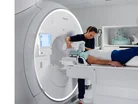Royal Philips Helps Hospitals Decarbonise Healthcare

Healthcare technology leader, Royal Philips, has shared the results of significant greenhouse gas (GHG) emission reduction, after a collaboration with customers across the world to assess and mitigate their carbon footprints, in addition to enhancing patient care and customer operational efficiency.
With healthcare systems causing over 4% of global CO2 emissions and significant materials usage, Royal Philips has long-recognised the link between human and environmental health.
In its ESG commitments, Royal Philips is driving the transition for healthcare that is both sustainable and equitable in order to provide greater care for more people. The company has been carbon neutral in its own operations, since 2020. By 2025, all new product introductions must be in line with Royal Philips’ EcoDesign requirements. The company aims to generate 25% of its revenue from circular products and services by that year.
Globally, Royal Philips also aims to improve the health and well-being of 2bn people each year by 2025, including 300m people in underserved communities, as well as 1m workers in its supply chain.
Good intentions are not enough, good healthcare must be environmental stable
So far, key achievements include:
- Jackson Health System (US): 47% projected reduction in CO2e emissions through the replacement of legacy patient monitors, comprising 508-tonnes equipment lifecycle CO2e reduction and 177 tonnes CO2e reduction due to battery and paper savings.
- Champalimaud Foundation (Portugal): 24% emissions reduction per exam in its radiology and nuclear medicine department. By 2028, the goal is to halve the carbon footprint of its diagnostic and interventional imaging departments.
- Rennes University Hospital (France): Opportunities identified to lower annual emissions of the cath lab via energy savings and sustainable equipment upgrades.
- County Durham and Darlington NHS Foundation Trust (UK): A sustainability blueprint developed for the trust’s ICU, focusing on waste reduction and energy efficiency.
According to Robert Metzke, Global Head of Sustainability at Philips, good healthcare has to be environmentally sustainable, which means words and good intentions must be turned into positive actions.
“Philips is committed to co-creating solutions that drive measurable, impactful change,” he shared. “By working with like-minded action leaders around the world, sharing with them our expertise in sustainable healthcare operations, we are helping them to take critical and tangible steps toward a greener future, while at the same time enhancing patient care.”
Healthcare technology leader Philips says virtual care and AI is turning in an effort to cope with demand
The company also recently released the findings of its Future Health Index 2024 report, titled "Better Care for More People." Its ninth annual global report reveals a significant shift from healthcare leaders regarding virtual care and AI-enabled innovations to mitigate the challenges of workforce shortages, financial pressures and rising demand for services.
The report explores the increasing reliance on technological advancements to enhance patient care and streamline healthcare operations, as healthcare leaders grapple with ways to deliver efficiency under huge demand. The FHI 2024 report was based on research collected from across 3,000 healthcare leaders conducted in 14 different countries.
“Increasingly, we’re seeing long wait times and staff shortages making it difficult for people to access timely care when and where needed. The Future Health Index 2024 global findings show health leaders believe these barriers to access to quality care are getting larger,” said Shez Partovi, Chief Innovation & Strategy Officer at Philips. “This year’s report shows how innovations including AI are helping to free up time for staff and reduce wait times for patients. However, as health systems roll out AI tools to save time and reduce barriers to care, it’s critical to bring staff along on the journey to ensure an inclusive AI rollout with patient and clinician experience is at the forefront.”
******
Make sure you check out the latest industry news and insights at Healthcare Digital and also sign up to our global conference series - Tech & AI LIVE 2024
******
Healthcare Digital is a BizClik brand
